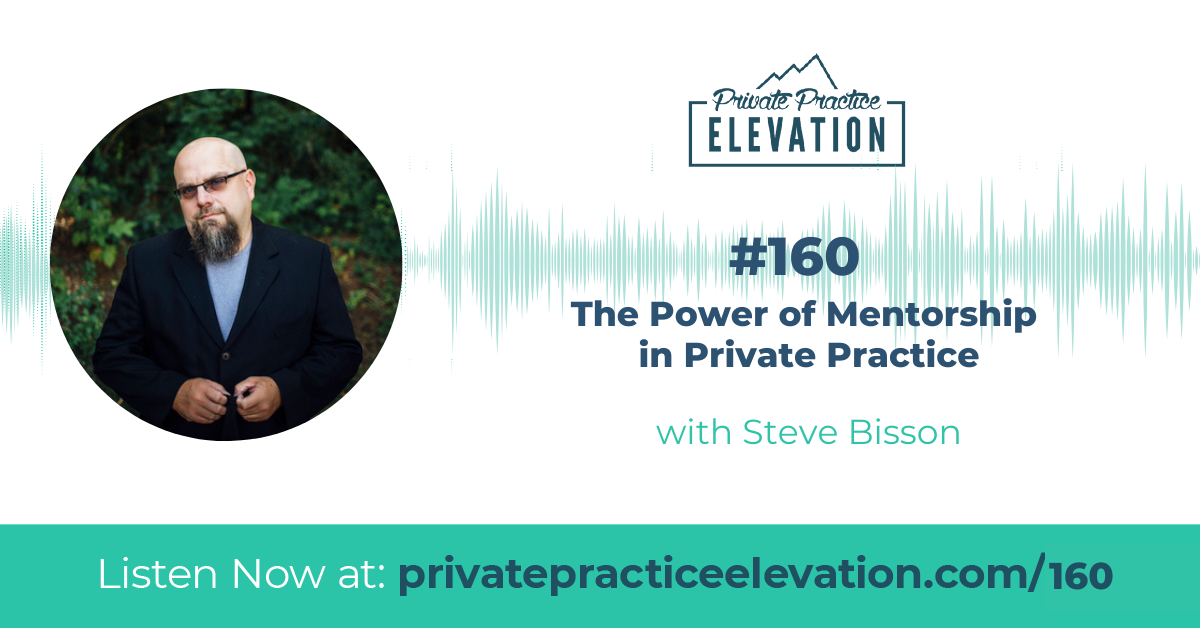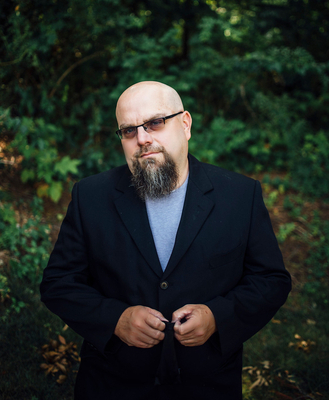In this conversation with Steve Bisson, you’ll learn all about mentorship – both giving and receiving – within private practice.
Steve discusses both his personal experience and the broader implications of mentorship in the professional development of therapists and mental health workers.
The episode delves into the core facets of finding and offering guidance in an often complex and challenging career path.
Throughout the episode, we unpack the nuanced differences between mentorship and other forms of professional development tools such as business coaching, as well as the organic nature of establishing pivotal mentoring relationships.
The discussion emphasizes the importance of authenticity and trust in these relationships, illustrating how mentorship can significantly influence personal growth and career progression.
The episode is filled with anecdotes and strategic advice, inviting both new practitioners and experienced professionals to consider the impact of mentorship on their journey through the mental health field.
Key Takeaways:
- Mentorship can be a pivotal factor in the personal and professional development of mental health professionals, often provided informally and based on mutual respect.
- The difference between business coaching and mentorship lies in the financial component and the structure; mentorship is often more organic and less goal-oriented.
- Seeking out mentors or becoming a mentor is an exercise in generosity, leveraging one’s experience and knowledge to empower others.
- It’s crucial to establish mentoring relationships that feel authentic and comfortable for true growth and learning.
- Mentorship extends beyond monetary value and is deeply rooted in the spirit of giving and leaving a legacy.
This Episode Is Brought To You By
Alma is on a mission to simplify access to high-quality, affordable mental health care by giving providers the tools they need to build thriving in-network private practices. When providers join Alma, they gain access to insurance support, teletherapy software, client referrals, automated billing and scheduling tools, and a vibrant community of clinicians who come together for education, training, and events.
Learn more about building a thriving private practice with Alma at helloalma.com/elevation.
Links mentioned in this episode:
- http://www.steve-bisson.com
- Podcast: Finding Your Way Through Therapy
- Steve Bisson’s Instagram: @realstevebisso
- Steve Bisson’s Facebook: Steve Bisso Services
About Steve Bisson
Steve Bisson is a Licensed Mental Health Counselor in Massachusetts and has been in practice for over 10 years. He has been in the field for over 20 years and specializes in Trauma, First Responders, and CBT. He hosts a podcast, Finding Your Way Through Therapy, based on his book of the same title.
Read It: The Art of Mentorship in Mental Health: Fostering Growth Through Guidance
In the vast and complex field of mental health, the journey of a professional is not merely about acquiring knowledge and practicing therapy; it’s equally about passing on wisdom and being guided through the treacherous and rewarding path of caring for others.
The recent podcast featuring Steve Bisson unveils the intricacies of mentorship, the delicate balance of giving and receiving advice, and the transformative impact it has on both the mentor and mentee. By tapping into authentic conversations about professional growth and empathy, we uncover the art of mentorship—a dynamic process rooting deeply in trust, respect, and shared experiences.
Key Takeaways:
- The importance of organic and comfortable mentorship relationships that align with personal values and professional needs.
- Mentorship as a channel for legacy and impact, extending beyond monetary gain to shape the field and individual practitioners ethically and mindfully.
- The power of informal mentorship in fostering confidence and competence through questioning, guiding, and empowering rather than instructing.
The Difference Between Mentorship and Business Coaching
Mentorship: A Relationship Above Transactions
Mentorship in the mental health sphere surpasses the goal-oriented, transactional nature of business coaching. Steve Bisson distinguishes between the two by highlighting that a mentor’s role is to support and guide on an as-needed basis without expecting payment, while a business coach specifically targets goal achievement often within a paid framework.
“It could be similar, but I see the big distinction is my business coaches that I’ve had push me to think outside the boundaries.”
The essence of true mentorship lies in the organic, no-expectations relationship that fosters personal and professional growth. Coming from a place of experience and goodwill, a mentor provides advice and support that’s critical for situations that need immediate attention as well as long-term development.
Cultivating Professional Pathways Through Mentorship
Mentorship contributes immensely to shaping professional identities. Bisson draws from his journey, illustrating how mentorship can shape careers from the early stages in a social services setting to running a private practice.
“You can gravitate towards people you feel more comfortable with, and I think that that’s a little different than supervisor and supervision.”
By aligning with a mentor who resonates with your approach and challenges, there is an opportunity to expand your horizon with wisdom that is practical, relevant, and nurturing.
Finding and Becoming a Mentor: An Act of Generosity
Seeking Guidance in Unfamiliar Territory
For those early in their careers or at pivotal junctures, finding a mentor can feel daunting. Bisson encourages seeking out individuals with a respected track record and open-mindedness.
“You can find them through Facebook, you can find them through other ways. And ultimately just… start your own mentorship group.”
This approach opens doors to reciprocal learning experiences where established professionals can offer insights while the mentee contributes fresh perspectives, fostering a community of growth.
The Generous Impact of Giving Mentorship
On the other end, becoming a mentor is presented as an exercise in generosity, an opportunity to give without immediate reward. Bisson reflects on the organic evolution of his role as a mentor, emphasizing the gratification derived from empowering others.
“Being able to mentor also, people to succeed in private practice, because it is a very hard thing to do.”
By encouraging professionals to take the initiative in giving back through mentorship, Bisson identifies this nurturing role as crucial for the industry’s advancement.
The Tangible and Intangible Benefits of Mentorship For Therapists
Impactful Moments in Mentorship Encounters
The real power of mentorship isn’t in the amount of time spent or specific achievements—it’s in those pivotal interactions that leave a lasting mark. Bisson shares one of his most influential mentorship moments which consisted of a simple yet profound question on another’s treatment approach.
“Sometimes they just told me, no, Steve, you’re in left field. Get back into the game. And that’s okay, too.”
It’s through these honest exchanges that personal and professional growth is catalyzed, leaving a legacy that is felt long after the mentorship relationship may have formally ended.
Mentorship as a Mechanism for Legacy
The overall essence of being a mentor or mentee extends beyond the tangible act of mentoring itself. It’s about building a legacy. For Bisson, his approach to mentorship is deeply rooted in the spiritual aspect of leaving a positive imprint on the globe, transcending material success.
“Your legacy is probably more important than anything else and how people are going to remember you.”
A mentor’s influence shapes careers, personal development, and continues the cycle of mentorship, advancing the field while simultaneously enriching individual lives.
In a world where the mental health profession is constantly evolving, the role of mentorship remains a constant beacon of growth, learning, and connection. Whether you are giving or receiving guidance, remember that mentorship is a two-way street—a confluence where experiences and knowledge flow freely, driven by mutual respect and a shared passion for the betterment of the community.
As we delve into the heart of mental health practices, let us not forget the wisdom imparted by Steve Bisson; mentorship is not a mere transaction but an enriching journey that weaves the fabric of our professional legacy and human compassion.




